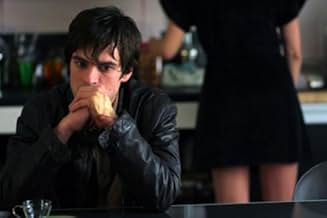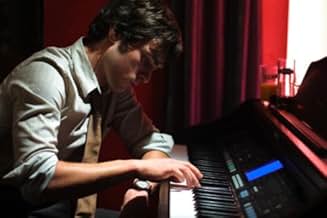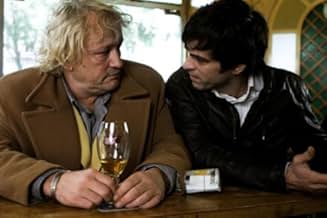¿Seguirá Thomas llevando una vida de crimen y crueldad, igual que su matón padre, o perseguirá su sueño de convertirse en pianista?¿Seguirá Thomas llevando una vida de crimen y crueldad, igual que su matón padre, o perseguirá su sueño de convertirse en pianista?¿Seguirá Thomas llevando una vida de crimen y crueldad, igual que su matón padre, o perseguirá su sueño de convertirse en pianista?
- Dirección
- Guionistas
- Elenco
- Ganó 1 premio BAFTA
- 22 premios ganados y 14 nominaciones en total
- Dirección
- Guionistas
- Todo el elenco y el equipo
- Producción, taquilla y más en IMDbPro
Opiniones destacadas
Basic plot line involves a young man, 'Tom', who is very much caught up in 'the life' of being a thug like his father. He pals around with his two partners and they work hard by day and party harder at night (usually ending with a barfight). Then one day he spots his deceased mother's old music agent who offers him an audition in gratitude (Tom's mother was a professional concert pianist).
What follows is an intriguing and humorous plot line as Tom takes on a piano coach (from Beijing no less) and tries to regain his affinity with the piano almost ten years after he'd stopped playing.
Extremely well-acted film with Romain Duris (as 'Tom') offering up one of those rare performances that's absolutely mesmerizing (most USA audiences will remember him from "L'Auberge espagnole" - another French film worth your time!).
It's usually the other way round, but this time the French took a shot at remaking an American film, James Toback's FINGERS (1978), which starred Harvey Keitel. And the result is excellent. This riveting human drama by Jacques Audiard features an impressive performance by Romain Duris as Tom, a 28 year-old hoodlum who seems destined to follow in his father's footsteps as a property shark working in a sleazy, barely legal twilight zone of the dodgy Parisian real-estate world. But a chance encounter with a former music teacher leads him to believe that he can become, like his mother, a concert pianist. With the help of a young virtuoso pianist, who just arrived from China, he starts preparing for a crucial audition, but soon the pressures from his former pals mount and he gets trapped between two opposite worlds. But Tom is not just a sensible artistic young man desperately trying to escape the world he lives in. He's not entirely sure he wants to leave his old life behind him. He's got a mean streak and when necessary, he takes care of some unresolved matters using whatever means he deems appropriate to take care of unwilling partners, squatters or whoever gets in the way of his (or his father's business interests), really putting the squeeze on people unwilling to cooperate.
Romain Duris injects his role with an enormous amount of vibrancy and energy. I've never seen Duris in another role before, but his character is complex, perennially nervous, strained, angry, but incredibly charming. One moment he's in leather jacket, wiping the blood of his face after a little bashing with some squatters. The next, he's in suit and tie and negotiates with real-estate moguls. The film's atmosphere is dark, moody and downbeat, but Tom's vibrant energy and aggression firmly keeps the viewer's attention. Jacques Audiard's direction is remarkable assured. He seems to know exactly what he wants to present on the screen, never showy and a keen camera eye to give the already top-notch performances maximum impact. What's so refreshing, is that the film doesn't make a big point out of the human relationships. It never becomes overly sentimental, but at the same time all these characters are real and completely believable, just incredibly vivid characterizations. Sharply written, stylish, expertly paced, directed and performed, this is definitely one to catch.
Camera Obscura --- 9/10
The low-life, Thomas Seyr, is a real-estate broker who's involved in all sorts of shady business deals; he and his slimy partners, Fabrice (Jonathan Zaccai) and Sami (Gilles Cohen), spend much of their time chasing squatters out of the buildings they've procured (planting rats in their room is a favorite tactic), and trying to work their way around government housing regulations (when a group of homeless come to take up residence in one of their tenements they hurriedly smash everything, rendering the rooms uninhabitable; the script seems to be taking advantage of certain sore social issues here). Thomas, a button-man who happens to sometimes work in an office, was born to this kind of work; his father, Robert (the marvelous Niels Arestrup), is also involved in less-than-legitimate enterprise, and sometimes calls upon Thomas to take care of unpleasant business (like beating people up who refuse to pay). Thomas, however, has an unexpected artistic side; his deceased mother was a concert pianist, and one day while driving around the city he encounters her old manager, Fox (Sandy Whitelaw), who encourages him to return to his study of the piano, which he has nearly given up. This awakens in Thomas some latent ambition, a desire to escape his sleazy circumstances; he re-commits himself to his art, which leads him to the door of a recent Chinese immigrant, Miao Lin (Linh Dan Pham), who tutors him, somewhat awkwardly as she speaks no French and he no Chinese. Thomas's less-than-honest life has saddled him with numerous obligations however, ones it will be difficult to leave behind.
The movie's theme is a familiar one: the impossibility of entirely escaping one's past, especially when one is still actively engaged in living the life that has caused one to have a shady past in the first place. Rather than deal with this in some abstract way, Audiard tackles the theme organically; we see what a bundle of unspent nervous energy Thomas is, and realize how his essential personality, his craziness, is the thing that really keeps him from being a pianist instead of a thug. This is not a story of fate being for or against anyone; it's not some cosmic force that keeps Thomas from leaving behind his old life but his own nature, and that of the people around him, especially his father, who is fundamentally a coward and needs Thomas to take care of things for him. Thomas's artistic endeavors are hindered by his inability to focus himself; he can't sit still for a second, and when he plays, the frustration drives him to hammer the keys like he should be able to beat a tune out of the instrument the same way he beats money out of people who owe. His personality is all jagged edges, and what he needs is to smooth them out, to reign in his impulses, his anger. This makes his introduction to Miao Lin all the more fortunate, for she has the patience of a saint, the quiet firmness needed to help tame his immature nature, to bring his fires under control. Romain Duris gives a live-wire performance as Thomas, something reminiscent of the Mean Streets De Niro, and that other great seventies sleaze-ball actor Warren Oates. He's basically an overgrown kid; he seems like his system is always pumped full of sugar (or maybe something stronger), and he has no inhibitions whatsoever which makes him a kick to be around, yet there's something doomed about him, the quality of a ticking time-bomb. Thomas might be a fun guy and a loyal friend (his loyalty is one of his failings), but you just know that sooner or later life is going to blow up in his face.
Audiard and writing partner Tonino Benacquista have smoothly transplanted the plot of James Toback's '70s cult item Fingers (which starred Harvey Keitel), and tweaked it to make it work in modern-day France. The pair seem to have an affinity for rough-edged-but-lovable characters coming under the influence of tender-but-firm women; their earlier film, Read My Lips, dealt with a similar situation, but was more straightforwardly a thriller, and didn't seem as refined either narratively or thematically as The Beat That My Heart Skipped. Audiard is a fantastically assured director, able to infuse a scene with energy without resorting to empty stylistics, and able to elicit dynamic performances that never edge into showiness. Audiard has a feel for the natural energies his actors give off; he taps into Duris's nervous charm, the nagging inadequacy of Niels Arestrup as Thomas's nuisance of a father, the radiant stillness of Linh Dan Pham as Miao Lin. This is one director who makes good movie-making seem easy, rather than making it seem hard on purpose so people will appreciate it more. Add Audiard to the list of modern directors whose next film is a must-see
Jacques Audiard, not the most famous but certainly one of the most talented french directors of the last ten years, has remarkably transcribed the mythology and some of the most eminent film-noir themes onto the modern era. The framing, lighting, music (especially its juxtaposition), mood and plot development are spot-on while the main performance my Romain Duris is career defining. The film stands out as one of the best modern neo-noir -a film with a rather singular style, akin to the director's equally commendable previous works.
As a character study of Thomas, the film somewhat succeeds in presenting his ambivalence as a petty criminal and as a frustrated pianist that is trying to regain his skill in playing the instrument. Thomas is, from all accounts, an ugly character that will engage in all kinds of under handed situations in order to make a living. Most of the motivation in Thomas' actions is driven by his loyalty to his small crook father, who is constantly nagging him to take care of the old man's criminal activities as well.
In Romain Duris, director Audiard gets a multi layered performance that is what keeps the film going. Mr. Duris, an intense actor, is the dominant figure in the movie, and perhaps the excuse for seeing the film. Nils Arestrup, as the father, has also some good moments.
¿Sabías que…?
- TriviaRomain Duris's sister is a pianist, and she is the one who taught him to play piano for this film.
- Citas
Sami: Playing piano is making you flip. Stop it now!
Thomas Seyr: Nothing's making me flip. I'm not flipping. I'm having a ball. I feel fantastic, dont' you see? It's important, I'm serious about it.
Sami: You gonna make dough from pianos?
Thomas Seyr: Not pianos, the piano! It's not about making money, it's about art.
Sami: What's in it for us? You coming to meetings all, 'Hi guys, I've been playing piano.' Shit, I'll take up the banjo.
Thomas Seyr: It's over your head
- ConexionesRemake of Fingers (1978)
Selecciones populares
Detalles
- Fecha de lanzamiento
- País de origen
- Sitios oficiales
- Idiomas
- También se conoce como
- The Beat That My Heart Skipped
- Locaciones de filmación
- Productoras
- Ver más créditos de la compañía en IMDbPro
Taquilla
- Presupuesto
- EUR 5,300,000 (estimado)
- Total en EE. UU. y Canadá
- USD 1,023,424
- Fin de semana de estreno en EE. UU. y Canadá
- USD 65,365
- 3 jul 2005
- Total a nivel mundial
- USD 11,757,109
- Tiempo de ejecución
- 1h 48min(108 min)
- Color
- Mezcla de sonido
- Relación de aspecto
- 1.85 : 1


















